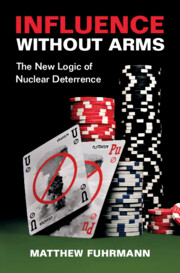
-
Select format
-
- Publisher:
- Cambridge University Press
- Publication date:
- 31 October 2024
- 14 November 2024
- ISBN:
- 9781108915106
- 9781108843201
- 9781108824071
- Dimensions:
- (229 x 152 mm)
- Weight & Pages:
- 0.65kg, 366 Pages
- Dimensions:
- (229 x 152 mm)
- Weight & Pages:
- 0.53kg, 366 Pages
You may already have access via personal or institutional login
Book description
How does nuclear technology influence international relations? While many books focus on countries armed with nuclear weapons, this volume puts the spotlight on those that have the technology to build nuclear bombs but choose not to. These weapons-capable countries, such as Brazil, Germany, and Japan, have what is known as nuclear latency, and they shape world politics in important ways. Offering a definitive account of nuclear latency, Matthew Fuhrmann navigates a critical yet poorly understood issue. He identifies global trends, explains why countries obtain nuclear latency, and analyzes its consequences for international security. Influence Without Arms presents new statistical and case evidence that nuclear latency enhances deterrence and provides greater influence but also triggers conflict and arms races. The book offers a framework to explain when nuclear latency increases security and when it incites instability, and generates far-reaching implications for deterrence, nuclear proliferation, arms races, preventive war, and disarmament.
Reviews
‘Influence without Arms is the most sophisticated study to date of how a state’s ability to build nuclear weapons in the near future impacts its behavior and that of its rivals today. Fuhrmann’s conclusions about the possibility of deterrence without actual weapons deployment are novel and should be widely read and debated.’
Scott D. Sagan - Stanford University, author of The Limits of Safety
‘Influence without Arms by Matthew Fuhrmann, one of the leading scholars of nuclear weapons, offers the rare gem of making a substantial, innovative contribution to the heavily studied area of nuclear weapons. Its account of the motives for and political consequences of nuclear latency - when states have nuclear programs but not actual weapons - is crucially important for both policymakers and scholars. We will have to scrap what we thought we knew about nuclear weapons and start over, incorporating the deeply researched insights provided in this book.’
Dan Reiter - Emory University, author of How Wars End
‘This book will change how we think about nuclear deterrence. Theoretically and empirically rich and meticulous, Influence without Arms shows how almost-nuclear states can gain international leverage, but at significant risk. Matthew Fuhrmann’s latent nuclear deterrence theory is essential for scholars and policymakers grappling with nuclear issues.’
Elizabeth N. Saunders - Columbia University, author of The Insiders’ Game
‘Relatively little work has been done on the causes and consequences of nuclear latency. Matthew Fuhrmann, one of the foremost scholars of nuclear politics, takes on this challenge in Influence without Arms. This agenda-setting piece significantly contributes to our understanding of nuclear politics and will shape academic and policy debates for years to come.’
Alexandre Debs - Yale University, co-author of Nuclear Politics: The Strategic Causes of Nuclear Proliferation
‘This book is an outstanding contribution to our knowledge about the nuclear age. It is impressive in its analyses, comprehensive in its scope and intriguing in the theory it presents. For better or worse, its relevance for international affairs is growing.’
Sverre Lodgaard Source: Journal of Peace Research
‘This excellent book is a pathbreaking study of the causes of nuclear latency and its potential impact on international politics.… Highly recommended.’
M. E. Carranza Source: CHOICE
Contents
Metrics
Altmetric attention score
Full text views
Full text views help Loading metrics...
Loading metrics...
* Views captured on Cambridge Core between #date#. This data will be updated every 24 hours.
Usage data cannot currently be displayed.
Accessibility standard: Unknown
Why this information is here
This section outlines the accessibility features of this content - including support for screen readers, full keyboard navigation and high-contrast display options. This may not be relevant for you.
Accessibility Information
Accessibility compliance for the PDF of this book is currently unknown and may be updated in the future.


